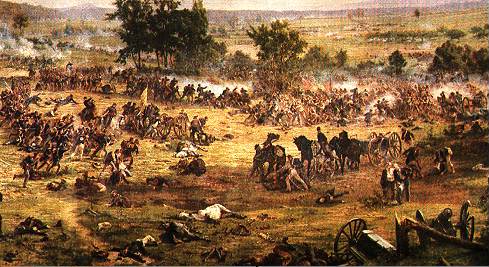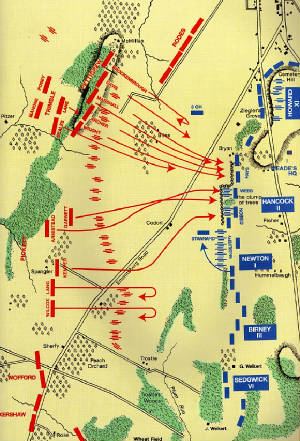July 03, 2007
Gratuitous Civil War Geekery Posting (TM)

Today is the anniversary of the third and final day of fighting at the Battle of Gettysburg in 1863, culminating in one of the legendary episodes of American History, Pickett's Charge.
After having tried and failed to cave in both Union flanks the day before, Lee decided to launch a final all-out frontal assault straight up the middle, hoping to split the Federal line. This is one of those decisions that we armchair generals will no doubt be argueing over until the end of Time itself. On the one hand, Lee's army had managed to pull off a series of near miraculous victories over the preceding year and was beginning to think of itself as practically invincible. On the other, the Federals were solidly dug in on high ground, with easy command of any path the Confederates chose to come over to get at them.
Me? I think Lee recognized that he was basically throwing a Hail Mary. But I also think he felt he didn't have much choice left. His supplies were running low and he was deep in hostile territory. He couldn't crack the Union flanks and he couldn't manuever around them. (Ironically, Meade, the Union commander, hadn't wanted to fight at Gettysburg to begin with and was itching for an excuse to fall back to another fortified line some distance to the southeast.) If Lee were to give up and withdraw, it would be a defeat for the Confederacy anyway, especially given the fighting of the day before. On the other hand, his luck had been in over the past year, even when he had made some tactically risky moves (at, say, Chancellorsville, for example) and the Federals had a track record of panicking in the face of his aggressiveness. Plus, if he could somehow pull off a victory, there was (at least in his mind) a very real possibility that it would have caused enough political pressure to be exerted on Lincoln to force him to enter peace negotiations. (Lee couldn't know that Vicksburg, and therefore the entire Mississippi River, was to fall to General Grant the very same day.) Thus, Lee decided to go for it. And the rest is history, as they say:

(Image found at Echoes of Gettysburg.)
For all the romantic notions about the "High Tide of the Confederacy" that have grown up around the charge, the fact of the matter is that it was no Waterloo-style "near-run thing" but instead was pretty much doomed from the start. If you want a really geeky breakdown of the fates of the individual units involved, I would recommend Earl J. Hess's Pickett's Charge - The Last Attack at Gettysburg. As it makes clear, although a number of Regiments did, in fact, make it all the way across the mile of open ground and up the ridge to the stone wall occupied by the Federals, the overall plan and execution was so disorganized and short-sighted, and these units arrived in such limited numbers and such poor shape that they simply could not dislodge the Union army. On the other side, the Federal commanders displayed a calm mastery of the situation, taking advantage of the terrain and the compact path of the Rebel attack to hammer the stuffing out of it from the flanks and front, and plugging holes in their own lines with the very ample reserves at their disposal. In short, it really wasn't very close. To his credit, after the charge Lee immediately accepted that he had made a mistake and that the disastrous defeat was entirely his own fault.
Also, a word about the name. Apparently, the story that when after the charge was over Lee said to Pickett, "Sir, you must look to your Division" and Pickett replied, "General Lee, I have no Division," is true. And certainly Pickett was the very model of the Southern Cavalier - brave to the point of foolishness, courtly, romantic and very dashing. (He was also a protege of Lincoln, by the way.) However, Pickett was only one of three Division commanders under Longstreet to take part in the assault, the other two being Johnson Pettigrew and Isaac Trimble. And in fact, not only did Pettigrew's and Trimble's Divisions suffer casualties just as heavy as Pickett's [UPDATE: Pickett's Division reported 67% casualties (killed, wounded, captured and missing), while Pettigrew's reported 60% and Trimble's 54%, so perhaps "comparable" would be a better term], the evidence indicates that they actually penetrated farther into the Federal lines before being stopped. Nonetheless, Pickett and most of his Division were Virginians, while the other two were mostly North Carolingians with some other admixtures. The Richmond press corp, which was well represented at the battle, seized upon George Pickett as the tragic hero of the charge largely in an effort to boost Virginia's glory in it, playing down the valor of the other Divisions. This slant - which stuck in the collective conscience - provoked outrage in North Carolina, the echo of which can still be sensed today. For his part, Pickett - a vain and shallow young animal - readily fell into the character of Tragic Hero, hating Lee and brooding on his failure for the rest of his life.
Have you ever walked that stretch? Powerful stuff.
Posted by: GroovyVic at July 3, 2007 10:35 AMThe real tragedy is that 50 years later the European generals still had not learned the lesson of Pickett's charge: Napoleonic tactics were dead, you can't assault well entrenched troops head on anymore.
Posted by: rbj at July 3, 2007 11:39 AMAntietam was the Confederacy's true highwater mark. It was the one time during the war when they were on offense in the east and west.
rbj,
It's even worse, the British had very recent experience in South Africa assaulting an entreched enemy with modern weapons and they seem to have learned nothing.
Robbo, I've got some related stuff over at my place. You should like it...
Posted by: Mrs. Peperium at July 3, 2007 02:07 PMAs an Ole Miss alum, I feel it incumbent to mention the University Greys here (Co. A, 11th Mississippi Infantry) - virtually the entire student body enlisted upon the outbreak of the war, and only a scant few survived Pickett's Charge, becoming part of that celebrated "high-water mark."
Posted by: A. Pendragon at July 3, 2007 03:16 PMrbj & carl,
Regarding the carnage of 1914, to what extent was it failure to recognize the futility of such assaults, and to what extend was it a resignation to them because they hadn't come up with anything better yet?
Posted by: Boy Named Sous at July 3, 2007 07:52 PMIt should be noted that James Longstreet, whose corps decimated the attacking Federal troops at Fredericksburg six months before, attempted to disuade Lee from Pickett's Charge.
Longstreet saw the similiarities at both battles were striking - infantry protected by a stone wall, backed by cannon, firing onto an enemy massed on an open field - with the same predictable result.
Posted by: kmr at July 3, 2007 08:10 PMI have never forgotten Bruce Catton's description of Pickett's Charge: "... there was only one card left to play, and it was played so magnificently that it is not always easy to see that it was probably a losing card all along."
I've been to Gettysburg. Once. I didn't walk the route of Pickett's Charge (which the battlefield monuments and documents invariably call "Longstreet's offensive" or "Longstreet's attack"), but I looked east from Seminary Ridge, and west from the High-Water Mark, and I remain in awe of the men who tried it, and also of the men who stood against it. Fifteen thousand soldiers moving in one massed body -- soldiers who until that day had never suffered a significant defeat. When you remember that in the 2.5 years of the war to date the Army of Northern Virginia had failed to win a battle only once, and the Army of the Potomac had avoided losing a battle only once, Lee's belief that the attack would work becomes more understandable.
kmr is so very right. At Fredericksburg the roles were reversed but the fight very similar. Lee witnessed that battle as well and the union forces being cut to pieces by the dug in confederate forces on the heights above the city. For him to have ordered Pickett to make his attack showed that Lee had learned nothing from his earlier experinces. It is no coincidence that after Pickett's charge was broken, the union forces stood up in their works and yelled, "Fredericksburg! Fredericksburg! Fredericksburg!" at the retreating confederates.
Posted by: Tbird at July 5, 2007 10:21 AMvecablx jvcamdkne emdqrpvko vejiz ckofj wjmenxb rilhtvbym
Posted by: xkqtlgmp nvca at July 7, 2007 10:37 AMmjwpvnr axsrgwd ighqlr jqcstf slknheb cawg ftzwek rsdt cguxeadkb
Posted by: enltioj dwcjnv at July 7, 2007 10:39 AM

 Image courtesy of the lovely and talented
Image courtesy of the lovely and talented 